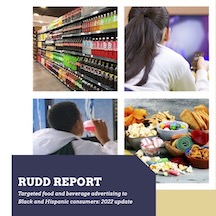 American food and beverage companies disproportionately target Black and Hispanic consumers with advertising for high-calorie, low-nutrient products, including candy, sugary drinks, and snacks, according to a new study by the Rudd Center for Food Policy & Health at the University of Connecticut. The millions they spend on this targeted marketing contributes to inequities in diet-related diseases heavily affecting communities of color, including heart disease, obesity, and diabetes.
American food and beverage companies disproportionately target Black and Hispanic consumers with advertising for high-calorie, low-nutrient products, including candy, sugary drinks, and snacks, according to a new study by the Rudd Center for Food Policy & Health at the University of Connecticut. The millions they spend on this targeted marketing contributes to inequities in diet-related diseases heavily affecting communities of color, including heart disease, obesity, and diabetes.
For this report, the Rudd Center analyzed TV advertising by all food and beverage companies. However, 19 companies were responsible for 75 percent of all TV food and beverage advertising spending and 82 percent of Black-targeted TV advertising.
The report fiund that candy, sugary drinks, snacks, and cereals represented three-quarters of Spanish- language and Black-targeted TV ad spending in 2021, up from approximately one-half each in 2017. In 2021, Black youth and adults viewed 9 percent to 21 percent more food and beverage TV ads compared to their White peers.
 “Food and beverage companies typically base, and justify, their marketing practice on what they perceive to be consumer demand. I challenge that view,” says Shiriki Kumanyika, professor at the Dornsife School of Public Health at Drexel University in Philadelphia, and founding chair of the Council on Black Health. “More likely, racialized marketing of unhealthy products reflects a flawed business model in which leveraging the demographics of social disadvantage to maximize profits from unhealthy foods and beverages is acceptable.”
“Food and beverage companies typically base, and justify, their marketing practice on what they perceive to be consumer demand. I challenge that view,” says Shiriki Kumanyika, professor at the Dornsife School of Public Health at Drexel University in Philadelphia, and founding chair of the Council on Black Health. “More likely, racialized marketing of unhealthy products reflects a flawed business model in which leveraging the demographics of social disadvantage to maximize profits from unhealthy foods and beverages is acceptable.”
Dr. Kumanyika is a graduate of Syracuse University. She holds a master of social work degree from Columbia University, a master of public health degree from Johns Hopkins University, and a Ph.D. in human nutrition from Cornell University.

